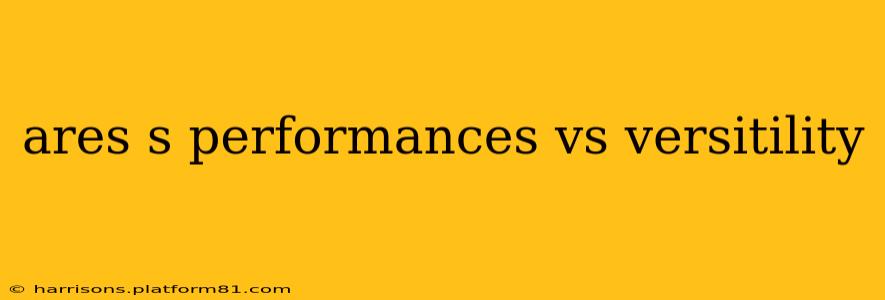Ares' Performances vs. Versatility: A Deep Dive into the God of War
Ares, the Greek god of war, is a complex figure often depicted as a brutal and impulsive warrior. While his raw power and battlefield prowess are undeniable, understanding his "performances" – meaning his actions and impact in myths – requires examining them alongside his often-overlooked versatility. This isn't simply a matter of comparing strength against adaptability; it's about comprehending the multifaceted nature of a deity whose role extended beyond mere combat.
How Powerful Was Ares in Battle?
Ares' strength is legendary. He's consistently portrayed as a formidable fighter, a force of nature on the battlefield. His iconic attributes – spear, shield, and war chariot – symbolize his dominance in direct conflict. Numerous myths detail his participation in battles, both against mortals and other gods, showcasing his exceptional martial skill and ferocity. He's not simply a warrior; he is war, embodying its chaotic energy and destructive potential. However, his power, while immense, is not limitless. He was often defeated, highlighting a key element of his character.
Was Ares a Strategist or Just a Brute?
This is a crucial question that often gets overlooked. While Ares excelled in direct confrontation, he wasn't known for strategic brilliance. His actions were frequently driven by raw aggression, lacking the calculated cunning of Athena, for example. He often charged headfirst into battle, relying on overwhelming force rather than thoughtful tactics. This impulsiveness frequently led to his defeat, demonstrating a limitation to his otherwise considerable power. He was a powerful tool, but lacked the finesse to use it strategically across multiple situations.
Did Ares Have Any Other Abilities or Powers Beyond Warfare?
While warfare was his primary domain, Ares possessed other abilities beyond mere combat. He was associated with courage and strength, traits he bestowed upon warriors. His influence extended to the breeding of horses, reflecting his connection with the raw, untamed power of nature. While less prominent than his martial abilities, these aspects contribute to a more comprehensive understanding of his multifaceted nature. It’s important to note these less-emphasized powers were still within a thematic framework that correlated with strength and dominance.
How Does Ares' Impulsiveness Affect His Overall "Performance"?
Ares' impulsive nature significantly impacted his "performances" throughout mythology. While his strength was undeniable, his lack of foresight and strategic thinking often led to his defeat. This demonstrates that sheer power isn't always sufficient for victory, especially against more cunning adversaries. His actions were often reckless, and it’s this impulsiveness that often overshadowed his raw strength and power.
What Are Some Examples of Ares' Successes and Failures in Battle?
Ares' successes are abundant. He participated in many crucial battles, demonstrating incredible physical prowess, inspiring fear amongst his foes. However, his failures are equally noteworthy. His defeats, often at the hands of more cunning opponents like Athena, highlight the limitations of his impulsive nature and reliance on brute force. This blend of success and failure makes him a complex and compelling figure, highlighting the limitations of relying solely on strength.
How Does Ares' Versatility Compare to Other Greek Gods?
Compared to gods like Athena, who excelled in strategy and wisdom, or Hephaestus, who displayed mastery of craftsmanship, Ares' versatility is limited. His domain is primarily focused on war, while other gods possess a broader range of abilities and influence. This does not diminish his importance, rather it highlights the unique position he holds in the Greek pantheon. While he lacks the broad versatility of certain gods, the intensity of his singular focus and his raw power are arguably unmatched by others.
In conclusion, while Ares undeniably possessed immense power and was a force to be reckoned with on the battlefield, his lack of strategic thinking and impulsive nature significantly limited his overall "performances." Understanding the interplay between his raw strength and his limited versatility provides a nuanced perspective on this complex and compelling god of war. He was a mighty warrior, but ultimately a one-trick pony, powerful within his sphere, but lacking in broader application of his abilities.
